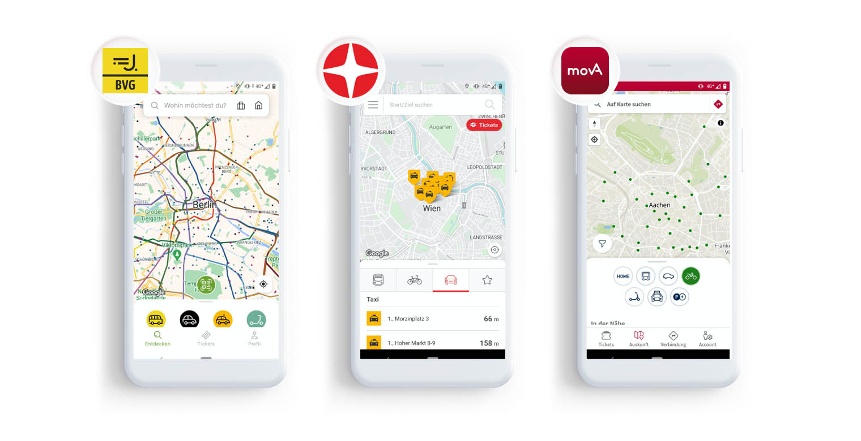At a time when environmental awareness is growing and urbanization is advancing, cities and residents are looking for sustainable and efficient mobility solutions. Mobility-as-a-Service platforms have a promising message: they want to seamlessly integrate different mobility services and create easy access to them.
So far, so good - but what does this mean for shared mobility providers? What are the advantages and disadvantages of being integrated into a MaaS platform? This article provides an overview of the factors that play a role in relation to MaaS in order to help you as a sharing provider with decision-making.
What are MaaS platforms?
Mobility-as-a-Service describes the idea that the focus of mobility is not on a single means of transport, but on the goal of getting to a specific location as efficiently as possible.
A Mobility-as-a-Service platform (MaaS platform) is therefore a digital ecosystem that combines different mobility services such as car sharing, bike sharing, scooter sharing, public transport, car rental, ride sharing and ride hailing on one platform.
Users only need one app to choose the right mobility solution based on their needs and the available offers. In addition to travel information and planning, some MaaS platforms also enable booking and payment.

The reason for the existence of MaaS
The mobility market is becoming increasingly complex: every year not only new providers are added, but also new forms of mobility.
Whereas in the past you often only had to choose between the bus and your own car, today it is becoming increasingly opaque as to how to get to your destination in the most convenient, cheapest or fastest way.
MaaS platforms are trying to close a gap here and make it easier for users to compare various options and make a decision. This promotes multimodal mobility - i.e. mobility that combines different forms of mobility - and thus contributes to the necessary mobility transition.
Who operates MaaS platforms?
A large number of existing MaaS platforms are operated by local transport associations, such as the Vienna app “WienMobil”, “Jelbi” from Berlin or “movA” in Aachen. In these cases, the focus is generally on public mobility and the platforms are intended to help promote multimodal mobility locally.
Aggregator apps: the local mobility market in one app →
There are also other MaaS platforms, including private ones. For example, Germany's largest car rental comparison platform billiger-mietwagen.de now also operates a car sharing portal. In addition to contributing to the mobility transition, private operators also have a profit motive.
The individual MaaS platforms usually differ in terms of the range of functions for users and the depth of integration and cooperation conditions for providers. Not all of the following aspects therefore apply equally to all platforms.

The advantages of MaaS platforms
Higher user satisfaction
The big winners of MaaS platforms are first of all the users: For them, the complexity of the mobility market is reduced, as described above.
Instead of needing a separate app for each mobility service, a MaaS app gives them access to various, or even all, local services. This increases user satisfaction and the likelihood that more people will use alternative mobility options - which ultimately benefits everyone.How shared mobility can help the climate →
Increased visibility and utilization
The presence on MaaS platforms promises sharing providers one thing above all: to be visible where users are looking for mobility solutions.
MaaS platforms are particularly attractive for providers if they have a large, existing user base. The integration gives you access to them and your sharing offer gains greater market presence, awareness and utilization.No fixed monthly costs for providers
There are usually no fixed monthly costs for the listing. On the contrary, other marketing costs can potentially be saved as new customers are reached via the MaaS platform.In addition, many MaaS platforms have extensive mobility data that you can access and which can potentially help you to optimize your own offering.

Every service has its price
Nevertheless, many sharing providers also have concerns and unanswered questions when it comes to integration into a MaaS platform.
Loss of identity
On the MaaS platform, the focus is initially on this brand, and not on the brands of the integrated services. Some providers fear a loss of identity as a result.
There is no general answer to whether this concern is justified. Check whether your own brand presence and the potential to reach new customers are in balance. The needs and requirements for both factors vary from company to company.
Cannibalization of your own app
It is quite conceivable that users who want to complete a booking via the existing access to the vehicles will not be able to do so because the vehicle has already been booked via the MaaS platform. This is therefore in competition with one's own app or booking option.
As a provider, you should ask yourself whether you make a difference in the value of customers via the MaaS platform vs. your own app, or whether you are primarily concerned with ensuring that the vehicles are better utilized. The following aspect may also play a role in the answer.
Commission on bookings
Some, but not all, MaaS platforms take a commission on completed bookings. The exact amount is contractually agreed.
This kind of commission can initially seem daunting - after all, it reduces your revenue per booking considerably. In return, however, there is of course a service behind the commission: the MaaS platform gives you access to its user group, which means that the commission can be seen as a marketing expense.
Ultimately, you should always check on a case-by-case basis whether the calculation works.
Market influence of MaaS platforms
Depending on the size and strategy of the MaaS platform, it cannot be ruled out that it could gain market power in the future, which could have an impact on contract terms and commission levels - but of course also on the number of users.
The hotel industry has experienced this in the past through platforms such as booking.com, the urban sports world through the Urban Sports Club. As is usually the case, there are always two sides to the coin: Large platforms give you users that you wouldn't otherwise have, but they also determine a large part of the rules of the game.

Complexity of technical integration
The depth of the integration is decisive for the respective technical effort. However, you should assume that you will always need an expert who can take care of technical adjustments and data synchronization.
Data protection and security
What stops quite a few sharing providers from integrating their offering into a MaaS platform is the loss of control over user data. This is because this is usually held by the MaaS platform, as only it has a direct customer relationship.
As a provider, you should therefore make sure when choosing a platform that it complies with the applicable data protection regulations and also has sufficient identity verification procedures to ensure that your vehicles are adequately protected against fraud.
So where does it all come down to?
In order to decide for or against working with the respective MaaS platform, you should first be aware of which factors are particularly important to you.
This could be, for example, the depth of integration or access to the data collected on the platform. There may also be platforms that are particularly relevant to your location or business model and are therefore of strategic importance.
In addition, customer satisfaction should always remain the focus. Do you know the needs of your (potential) customers with regard to Mobility-as-a-Service? Which platform can best fulfill them? Ultimately, cooperation with a MaaS platform is successful if it significantly improves the user experience and this is also reflected in your booking figures.

7 principles for good MaaS cooperation according to bcs
In a position paper, the Bundesverband CarSharing e.V. (bcs) defines 7 principles for good cooperation between Mobility-as-a-Service platforms and car sharing providers. You can use these as a guide when making decisions.
These are the following guidelines:
The MaaS platform should guarantee transparent, realistic and non-discriminatory information about available mobility options.
The information provided by the platform influences the mobility behavior of customers and thus also the economic success of the providers. The MaaS platform's own interests should therefore not influence the information displayed.MaaS platforms should use technical standards.
Instead of each platform developing its own interface for data transfer, existing solutions should be used.Car sharing providers should be able to determine the prices and services they offer themselves.
Providers should be free to decide whether they want to enter into a cooperation.
Providers must be able to protect competitively relevant data.
This applies, for example, to vehicle availability data. It should always be possible to distinguish which data can be shared freely and which should be protected by authorization processes and terms of use.The data delivery obligations between the MaaS platform and the provider should be reciprocal.
In other words, in return for the information data provided, the MaaS platform should also make the collected demand data available. After all, demand data is an important basis for the providers' business development. In addition, certain customer data is required anyway for the provision of the service, including access control and, if necessary, the tracking of rule violations.User needs should determine the depth of MaaS integration.
Whether the booking, usage and payment functions should be integrated into a MaaS platform alongside the availability data should depend on what customers expect. Forwarding to the provider's own app via a deep link may involve lower costs and effort.

Conclusion: It is important to weigh up
In addition to numerous opportunities, MaaS platforms also offer shared mobility providers a number of challenges and risks. Which side prevails is individual, as both providers and MaaS platforms sometimes differ greatly from one another. It is therefore impossible to make a universal recommendation for or against integration.
However, the future of mobility is multimodal and connected. MaaS is very likely to play a growing role in the coming years. In order to remain successful in the future, you as a sharing provider should therefore not completely close your eyes to these trends.
Remain flexible and open to constantly developing yourself and your offering. The sooner you find ways to make strategic use of developments and play an active role in shaping them, the greater the benefits you will reap.




